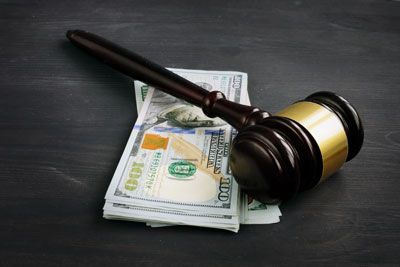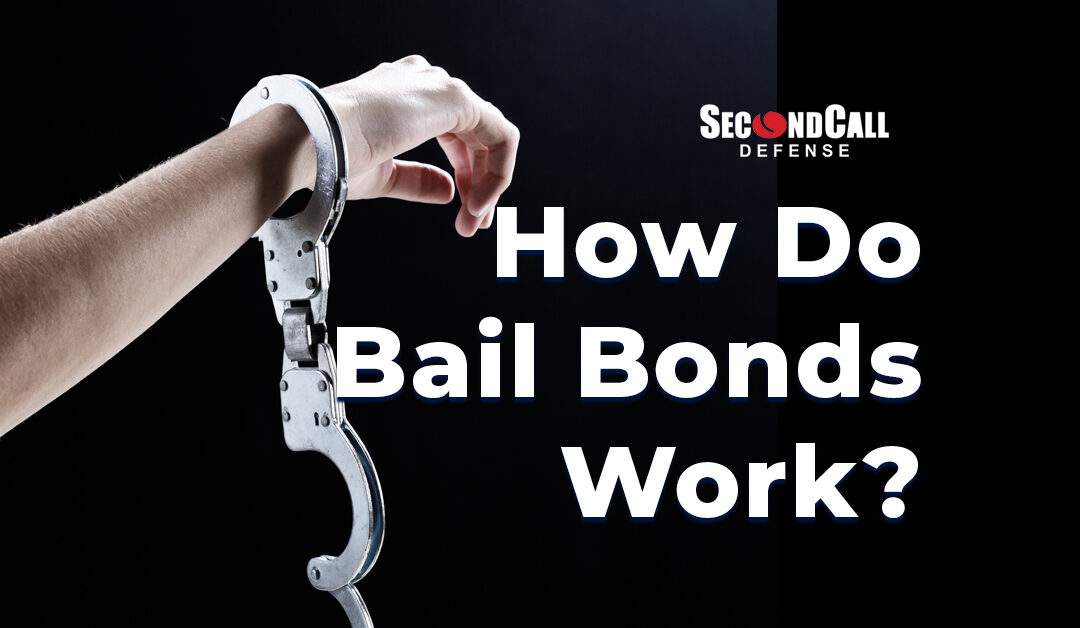Introduction to Bail Bonds
Imagine: You lawfully defend yourself from a violent attacker, maybe in your own home. But instead of being lauded, you’re arrested, charged, and thrown in jail. In order to get out, you post a bail bond. Later, the charges are dropped because, of course, you’re innocent. So naturally, you expect to get your bail money back.
For many people, unfortunately, this is not the case. That money is gone.
In this blog, we’ll explain how bail bonds actually work, why you may not get your money back – even if you’re found innocent – and why every law-abiding gun owner needs the kind of self-defense legal protection that only Second Call Defense provides.
What is Bail
In short, bail is a financial guarantee. It’s a promise that if the court releases you from jail, while charges are pending, you will return for all future court dates. (Bail also keeps jails from filling up with people who haven’t been convicted of a crime yet)
In most cases, the judge sets a dollar amount that serves as a form of collateral: show up to court, you’re good to go. Skip court, and the money is forfeited.
Bail amount varies depending on:
- Severity of charges
- Criminal history
- How likely someone is to flee the area (aka flight risk)
- Public safety concerns
If charged with a violent crime, especially involving a firearm (even if it was self-defense), bail amounts are often much higher than expected.
How Bail Bonds Work
Let’s say you’re charged with a violent crime and a judge sets your bail at $100,000. You have two options:
Option 1 (Bail set at $100,000)
Pay the full bail amount in cash. This is rare, given that most people don’t have that amount of cash lying around. But, this is an option, and if you show up for every hearing and comply with all court orders, you’ll eventually get your money back minus any court fees.
- You pay the full $100,000 in cash.
- You show up for every hearing and comply with all court orders.
- At the end of the process, your court fees come to $3,500.
- You’re refunded $96,500 of the original $100,000 you paid.
For smaller bail amounts, if you pay in cash, your court fees may take up the majority (or even all) of your bail amount.
Option 2 (Bail set at $100,000)
Use a bail bondsman. This is the most common route. A bail bondsman is a licensed professional who posts the “full” amount of bail on your behalf, but charges you a non-refundable fee (typically 10%).
- You pay the bondsman $10,000.
- The bondsman posts a $100,000 bond.
- You get out of jail while awaiting trial.
- They keep your $10,000.
In this scenario, you will not get the $10,000 back, no matter what happens. The 10% you pay them is a fee, not a deposit.
In addition, if you skip court or flee, your bondsman is now on the hook for the full $100,000 and will most likely send a bounty hunter after you AND begin procedures to recoup the $90,000 remainder. You can see why bondsman take flight risk very seriously, and why using one is not cheap.
The History of Bail Bonds in the United States
 Bail is rooted in English common law, but the modern American bail bond system as we know it today emerged in the late 1800s in San Francisco, California. The first commercial bail bond company, Taylor Brothers, revolutionized the idea of a third-party posting bail in exchange for a fee.
Bail is rooted in English common law, but the modern American bail bond system as we know it today emerged in the late 1800s in San Francisco, California. The first commercial bail bond company, Taylor Brothers, revolutionized the idea of a third-party posting bail in exchange for a fee.
Today, commercial bail is legal in most states (Illinois, Oregon, and Kentucky ban for-profit bail bonds), and it plays a crucial role in the criminal justice system. Critics argue it unfairly burdens the poor, while supporters say it allows defendants to regain freedom pending trial and keeps jails from overcrowding with defendants awaiting trial.
Regardless, if you find yourself in jail after a lawful self-defense shooting, the system will treat you like any other criminal defendant, and you will be dealing with bail just like anybody else.
How Bail Works in Self-Defense Cases
If you believe the Second Amendment gives you the right to defend your life and automatically shields you from arrest, think again.
In a perfect world, police would arrive on the scene, shake your hand, and thank you for eliminating a threat. But in reality, after a self-defense scenario, many lawful gun owners are:
- Detained or arrested on the spot.
- Held without immediate access to an attorney.
- Charged based on incomplete information or an overzealous prosecutor.
- Required to post bail just to go home.
Even if charges are eventually dropped or a grand jury refuses to indict, you may have already
- Paid thousands in bail bond fees.
- Missed many hours of work.
- Endured public scrutiny and media attention.
- Spent time in jail.
This is why legal defense services like Second Call Defense are not just helpful, but critical, in the event the unfortunate happens.
Common Bail Amounts for Firearm-Related Cases
Bail is technically up to the judge to decide, but here are some realistic and common bail amounts that may be seen in self-defense scenarios:
| Offence (Alleged) | Typical Bail Amount |
| Aggravated Assault with a Deadly Weapon | $10,000 – $50,000 |
| Manslaughter (even justified) | $50,000 – $150,000 |
| Murder (even in self-defense, until proven innocent) | $250,000 – $1,000,000+ |
| Negligent Discharge of a Firearm | $5,000 – $20,000 |
As you can see above, even relatively minor firearm-related charges may come with serious bail consequences. Regardless of your innocence, you must still pay to get out of jail and fight the case.
With bondsman, the bail bond fee is for:
- Getting you out of jail quickly.
- Taking financial risk on your behalf.
- Not having to sell your car, house, or other assets to come up with the cash to pay bail.
The fee is akin to paying interest on a loan. The bank gets paid even if you didn’t use the money for long.
The Importance of Self-Defense Legal Protection
Carrying a firearm for self-defense means being prepared for the worst, and that includes what happens after you pull the trigger. Even if you did everything right, the police might still arrest you. The prosecutor might still charge you. And before you ever get to explain your side, you could be sitting in jail waiting for someone to post bail.
Depending on the state, bail for a self-defense shooting can range from $50,000 to over $1,000,000. That means you’re looking at $5,000 to $100,000 out of pocket with a bondsman (more if you pay cash yourself) just to walk out of jail while your case is pending.
Ask yourself:
- Do you have cash ready for a bail bond if you were arrested tonight?
- Could your spouse or family navigate that process without you?
- Are you OK waiting days, or longer, in jail while they try to figure it out?
This isn’t a movie. You don’t always get a refund if charges are dropped. You likely won’t get an apology. And there’s a good chance you won’t get your money back.
That’s why self-defense legal protection isn’t optional. Second Call Defense covers:
- Bail bond payments up front. Not later, not reimbursed.
- Immediate access to an attorney who understands gun laws.
- 24/7 support from the moment you call.
- Legal, emotional, and financial protection when your life is turned upside down.
You carry a gun to protect yourself in a moment of danger. But don’t forget: after you defend your life, you’ll have to defend your freedom. Don’t do it alone. BUYERS GUIDE
Join Second Call Defense Today
Second Call Defense is committed to being there when you need help the most, starting with one of the scariest moments you can face: getting arrested after defending yourself. If you’re booked and held on bail, we step in immediately. We cover your bail bond up front, not as a reimbursement, so you don’t sit in jail waiting for family or friends to scramble for cash. From the moment you call, we also cover attorney retainer fees, legal costs, and civil defense, without asking you to pay it back later. With 24/7 emergency response and a 100% success rate defending our Members, Second Call Defense gives you the freedom to carry with confidence, knowing you’re backed by real legal protection when it counts most.
Conclusion
Using your firearm in self-defense may save your life, but it can also turn your life upside down. From the moment the police arrive, you’re not treated like a hero. You’re a suspect. And the legal system doesn’t wait to sort out the facts before it starts costing you time, money, and freedom.
Bail is just the beginning. You could be arrested, charged, and stuck in jail before a single fact about your innocence is heard. And unless you have thousands of dollars sitting in your checking account, ready to pay in cash or hand over to a bail bondsman, you’re relying on your family, your friends, or worse, a GoFundMe page, to get you out.
This is why self-defense legal protection isn’t a luxury. It’s a necessity. Second Call Defense stands ready 24/7. From the moment you call, we cover your bail bond up front, provide immediate legal support, and walk with you every step of the way, without reimbursement requirements or fine print.
You carry a gun to protect your life. Carry Second Call Defense to protect everything that comes after.

